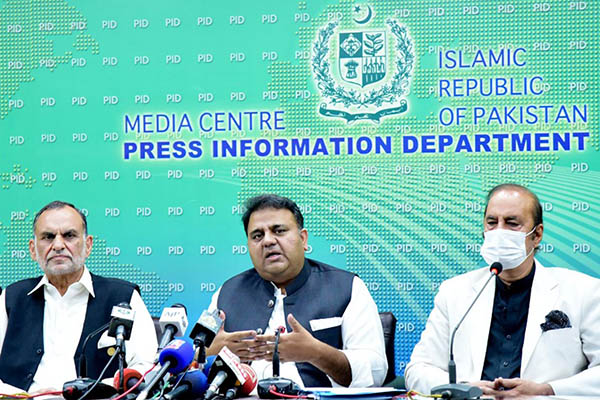
Photo courtesy PID
In press conference, members of federal cabinet accuse chief election commissioner of serving as opposition’s ‘mouthpiece’
The Pakistan Tehreek-e-Insaf-led government on Friday announced that it will place the Elections (Amendment) Act, 2021, before a joint session of Parliament set for Monday (Sept. 13) to ensure its passage amidst increasing criticism of its flagship electronic voting machines from opposition parties and the Election Commission of Pakistan (ECP).
“We have now decided to take the bill to the joint session of the Parliament on Sept. 13 and will convene a National Assembly session a day after that,” said Adviser to the P.M. on Parliamentary Affairs Babar Awan in a press conference alongside Information Minister Chaudhry Fawad Hussain and Railways Minister Azam Khan Swati. He claimed that the electoral reforms bill had already been passed by the National Assembly and accused the opposition of wanting to maintain the “status quo” with its refusal to accept controversial electronic voting machines.
After its passage by the Lower House, said Awan, the Senate was to pass it within 90 days but had rejected it only a few hours prior to the expiry of the stipulated period. Accusing the ECP of acting “beyond its ambit,” he
Burn it
The hastily convened press conference was prompted by media reports of Swati accusing the ECP of “always” rigging polls and claiming he wanted all such institutions to be “set on fire” during a meeting of the Senate Standing Committee on Parliamentary Affairs that was supposed to discuss proposed amendments to the Elections (Amendment) Act, 2021.
As the committee was set to vote on proposed amendments, Swati accused the autonomous ECP of “ridiculing” the government and told representatives in attendance they were not entitled to “ruin” democracy. To register their protest at Swati’s remarks, the ECP officials present at the meeting staged a walkout.
Opposition mouthpiece
The information minister, during the press conference, accused Chief Election Commissioner Sikandar Sultan Raja of acting as the “mouthpiece” of the opposition—despite Prime Minister Imran Khan being the authority to submit his name for the post. Claiming the ECP remained controversial due to its “strange logic,” he described it as the “headquarters for opposition parties.”
Resorting to the incumbent government’s frequent practice of accusing any dissenters as being influenced by the opposition, he went on to allege—without any evidence—that the CEC might have “sympathies” for opposition leaders. “The chief election commissioner—who may have had contact—naturally, he may have had close contact with [PMLN supremo] Nawaz Sharif, and others—and may even have sympathies for him, which we have no issue with—but whether it is the election commission, or any other institution, it must abide by Parliament,” he said, perhaps failing to consider that the sitting prime minister—and not any opposition leader—had forwarded Raja’s name for the top ECP post.
Continuing, Fawad urged the CEC to enter politics if he wished to work on legislation, stressing that the law-making body was Parliament and the ECP was bound to follow any laws it had implemented.
The information minister also alleged that opposition leaders were trying to make legal amendments related to the use of EVMs “controversial” without properly vetting them.
Senate rejects
On Friday, the Senate Standing Committee on Parliamentary Affairs rejected all proposed amendments to the Elections (Amendment) Act, 2021 regarding granting internet-voting rights to overseas Pakistanis; use of EVMs in the next general elections; and conducting the Senate polls through open ballot.
Earlier, the ECP had submitted a 37-point document to the committee, warning that the EVMs could not guarantee free, fair and transparent elections—as repeatedly claimed by the PTI—and contained easily altered software that could be used for rigging. “It is nearly impossible to ensure that every machine is honest,” the ECP had noted in the document. During the meeting, Awan accused it of feeling “threatened” by technology over its demands for a phased rollout of the EVMs that would allow deficiencies to be identified before nationwide implementation.
